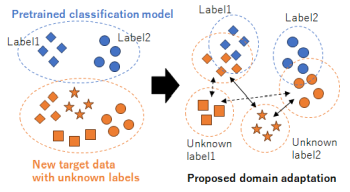
Domain adaptation, which transfers an existing system with teacher labels (source domain) to another system without teacher labels (target domain), has garnered significant interest to reduce human annotations and build AI models efficiently. Open set domain adaptation considers unknown labels in the target domain that were not present in the source domain. Conventional methods treat unknown labels as a single entity, but this assumption may not hold true in real-world scenarios. To address this challenge, we propose open set domain adaptation for image classification with multiple unknown labels. Assuming that there exists a discrepancy in the feature space between the known labels in the source domain and the unknown labels in the target domain based on their type, we can leverage clustering to classify the types of unknown labels by considering the pixel-wise feature distances between samples in the target domain and the known labels in the source domain. This enables us to assign pseudo-labels to target samples based on the classification results obtained through unsupervised clustering with an unknown number of clusters. Experimental results show that the accuracy of domain adaptation is improved by re-training using these pseudo-labels in a closed set domain adaptation setting.